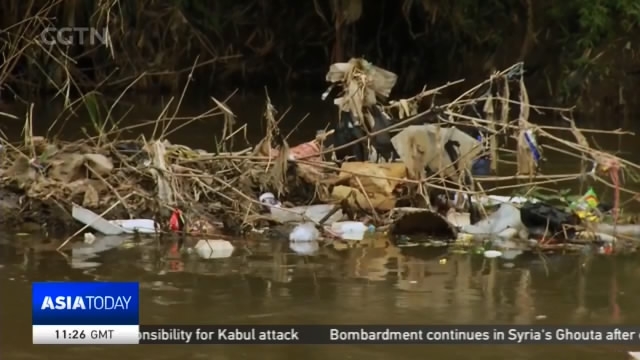
20:10, 27-Jan-2018
Indonesia Marine Pollution: President Widodo vows to clean world's dirtiest river in West Java

Indonesia is planning on a massive project to clean up West Java's Citarum river. It is one of the dirtiest rivers in the world, and yet still the main water source for millions of people. CGTN's Silkina Ahluwalia reports.
The Citarum river, stretching 270 kilometers, is an important source of life for nearly 30 million people across nine counties and three cities in West Java. But these waters are extremely polluted. A recent study called Citarum the world's dirtiest river with household and industrial waste flowing through the waters. Around 400 industries, mostly textile, dump their toxic waste into the river, threatening the lives of those living on the riverbanks.
SILKINA AHLUWALIA WEST JAVA, INDONESIA As you can see there are tons of trash out here. I can see plastic bottles, lots of food packaging and pieces of clothing hanging by the trees. This river isn't only important for the people in West Java, but even people in Jakarta rely heavily on these waters but as you can tell it's very unhygienic.
Citarum river's canal directly connects to the capital city. Almost 80 percent of Jakarta's water supply comes from this river. It's also a source of water power plant that produces electric power to the islands of Java and Bali. Deni is hoping his community's hard-work can help to conserve this important river. He is the leader of the Elingan organization, a group that helps to clean up waste floating on the river's surface.
DENI RISWANDANI COMMUNITY LEADER, ELINGAN "There are five different chemical wastes flowing through this river, including mercury and arsenic. Our community cannot do anything about that because that will be under the government's hands. But we have tried to block the waste from entering the river using concrete materials."
Everyday residents living by the banks dispose more than 400 tones of unprocessed waste into the river. That's a habit the Indonesian government is hoping to change with their new program.
SAFRI BURHANUDDIN DEP. MINISTER, COORDINATING MINISTRY FOR MARITIME AFFAIRS AND RESOURCES "The only way we can stop industries from throwing waste into the river is by creating strict laws against it. As for the residents living by the river, we have to change their mindset to make them realize that protecting their surrounding is important."
The project, which calls on stakeholders, residents and communities to work together, is a crucial first step to transform and clean one of the longest rivers on Java island. Silkina Ahluwalia, CGTN, West Java, Indonesia.

SITEMAP
Copyright © 2018 CGTN. Beijing ICP prepared NO.16065310-3
Copyright © 2018 CGTN. Beijing ICP prepared NO.16065310-3